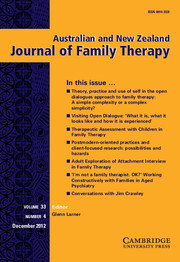Article contents
‘Coming Out Tales’: Adult Sons and Daughters' Feelings About Their Gay Father's Sexual Identity
Published online by Cambridge University Press: 02 March 2012
Abstract
Coming out to their children is a dilemma that concerns many gay, bisexual, and lesbian parents with children from previous heterosexual relationships. How children found out about having a father who identified himself as gay, and their feelings about their father's sexual identity, were explored through qualitative analysis of semi-structured interviews with 36 sons and daughters (aged 19 to 36 years) whose gay fathers participated in the Gay & Bisexual Parenting Survey (Barrett and Tasker, 2001). Interpretative Phenomenological Analysis revealed that awareness of their father's sexual identity was often left unspoken for various reasons, and that acceptance came about through gradual understanding as well as direct discussion. Interview data indicated the complexity of the relationship between the young adult's personal acceptance of their father's gay identity and their consideration of social context when deciding how open to be to others about their father's sexual identity. This research has varied implications for therapeutic work with gay and bisexual fathers coming out to their children from previous heterosexual relationships.
- Type
- Articles
- Information
- Australian and New Zealand Journal of Family Therapy , Volume 31 , Issue 4: Special Issue: Gay and lesbian parented families: Translating research into practice , 01 December 2010 , pp. 326 - 337
- Copyright
- Copyright © Cambridge University Press 2010
- 14
- Cited by




